Grammy Award for Best Instrumental Soloist Performance (without orchestra)
Der Grammy Award for Best Instrumental Soloist Performance (without orchestra), auf deutsch „Grammy-Auszeichnung für die beste Soloinstrument-Darbietung ohne Orchester“, ist ein Musikpreis, der von 1959 bis 2011 von der amerikanischen Recording Academy im Bereich der klassischen Musik verliehen wurde.[1]
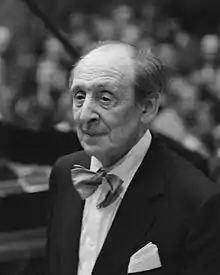
Geschichte und Hintergrund
Die seit 1959 verliehenen Grammy Awards werden jährlich in zahlreichen Kategorien von der Recording Academy in den Vereinigten Staaten vergeben, um künstlerische Leistung, technische Kompetenz und hervorragende Gesamtleistung ohne Rücksicht auf die Album-Verkäufe oder Chart-Position zu würdigen.[2]
Eine dieser Kategorien war der Grammy Award for Best Instrumental Soloist Performance (without orchestra).[3] Der Preis wurde von 1959 bis 2011 vergeben. Von 1967 bis 1971 und 1987 wurde er mit der Auszeichnung Grammy Award for Best Instrumental Soloist(s) Performance (with orchestra) kombiniert und als Grammy Award for Best Classical Performance - Instrumental Soloist or Soloists (with or without orchestra) verliehen.
Die Auszeichnung hatte mehrere geringfügige Namensänderungen:
- 1959 hieß die Auszeichnung Grammy Award for Best Classical Performance – Instrumentalist (other than concerto-scale accompaniment)
- 1960 nannte sie sich Grammy Award for Best Classical Performance – Concerto or Instrumental Soloist (other than full orchestral accompaniment)
- 1961 war die Bezeichnung des Preises Grammy Award for Best Classical Performance - Instrumental Soloist or Duo (other than with orchestral accompaniment)
- Von 1962 bis 1964 hieß er Grammy Award for Best Classical Performance - Instrumental Soloist or Duo (without orchestra)
- 1965 nannte er sich Grammy Award for Best Performance - Instrumental Soloist or Soloists (without orchestra)
- Von 1966 bis 1994 war die Bezeichnung der Kategorie Grammy Award for Best Classical Performance - Instrumental Soloist or Soloists (without orchestra)
- Ab 1995 die Kategorie als Grammy Award for Best Instrumental Soloist Performance (without orchestra) vergeben.
Die Auszeichnung wurde 2011 im Rahmen einer umfassenden Überarbeitung der Grammy-Kategorien eingestellt. Sie wurde mit der Auszeichnung Grammy Award for Best Instrumental Soloist(s) Performance (with orchestra) zur neuen Kategorie Grammy Award for Best Classical Instrumental Solo zusammengeführt.
Gewinner und Nominierte
| Jahr | Gewinner | Nationalität | Werk | Nominierte | Bild des/der Gewinner(s) |
|---|---|---|---|---|---|
| 1959 | Andrés Segovia | Segovia Golden Jubilee | _by_Erling_Mandelmann.jpg.webp) | ||
| 1960 | Arthur Rubinstein | Beethoven: Sonate Nr. 21 in C-Dur (Waldstein) und Nr. 18 Es-Dur | .jpg.webp) | ||
| 1961 | Laurindo Almeida | The Spanish Guitars of Laurindo Alemida | |||
| 1962 | Laurindo Almeida | Reverie for Spanish Guitar | |||
| 1963 | Vladimir Horowitz | Columbia Records Presents Vladimir Horowitz |  | ||
| 1964 | Vladimir Horowitz | The Sound of Horowitz |  | ||
| 1965 | Vladimir Horowitz | Vladimir Horowitz Plays Beethoven, Debussy, Chopin |  | ||
| 1966 | Vladimir Horowitz | Horowitz at Carnegie Hall - An Historic Return |  | ||
| 1967 | Von 1967 bis 1971 wurde der Grammy Award for Best Classical Performance - Instrumental Soloist or Soloists (with or without orchestra) vergeben | ||||
| 1968 | |||||
| 1969 | |||||
| 1970 | |||||
| 1971 | |||||
| 1972 | Vladimir Horowitz | Horowitz Plays Rachmaninow (Etudes-tableaux Piano Music; Sonatas) |  | ||
| 1973 | Vladimir Horowitz | Horowitz Plays Chopin |  | ||
| 1974 | Vladimir Horowitz | Horowitz Plays Scriabin |  | ||
| 1975 | Alicia de Larrocha | Albéniz: Iberia | |||
| 1976 | Nathan Milstein | Bach: Sonaten und Partiten für Violine solo | |||
| 1977 | Vladimir Horowitz | Horowitz Concerts 1975/76 |  | ||
| 1978 | Arthur Rubinstein | Beethoven: Klaviersonate Nr. 18 in Es-Dur/Schumann: Fantasiestücke op. 12 | .jpg.webp) | ||
| 1979 | Vladimir Horowitz | The Horowitz Concerts 1977/78 |  | ||
| 1980 | Vladimir Horowitz | The Horowitz Concerts 1978/79 |  | ||
| 1981 | Itzhak Perlman | The Spanish Album | 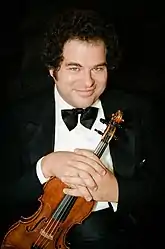 | ||
| 1982 | Vladimir Horowitz | The Horowitz Concerts 1979/80 |  | ||
| 1983 | Glenn Gould | Bach: Goldberg-Variationen | |||
| 1984 | Glenn Gould | Beethoven: Klaviersonaten Nr. 12 und 13 | |||
| 1985 | Yo-Yo Ma | Bach: Cellosuiten ohne Begleitung | 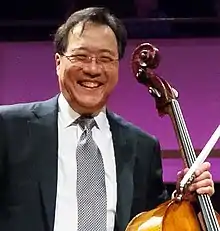 | ||
| 1986 | Vladimir Ashkenazy | Ravel: Gaspard de la nuit; Pavane pour une infante défunte; Valses nobles et sentimentales | 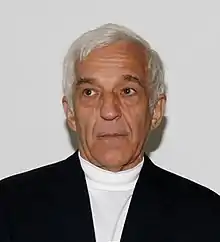 | ||
| 1987 | 1987 wurde der Grammy Award for Best Classical Performance - Instrumental Soloist or Soloists (with or without orchestra) vergeben | ||||
| 1988 | Vladimir Horowitz | Horowitz in Moscow |  | ||
| 1989 | Alicia de Larrocha | Albéniz: Iberia, Navarra, Suite Espagnola | |||
| 1990 | András Schiff | Bach: Englische Suiten | .jpg.webp) | ||
| 1991 | Vladimir Horowitz | The Last Recording |  | ||
| 1992 | Alicia de Larrocha | Granados: Goyescas; Allegro de Concierto; Danza Lenta | |||
| 1993 | Vladimir Horowitz | Horowitz - Discovered Treasures (Chopin, Liszt, Scarlatti, Scriabin, Clementi) |  | ||
| 1994 | John Browning | Barber: The Complete Solo Piano Music | |||
| 1995 | Emanuel Ax | Haydn: Klaviersonaten Nr. 32, 47, 53, 59 | 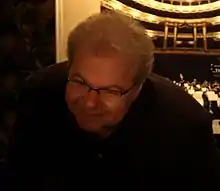 | ||
| 1996 | Radu Lupu | Schubert: Klaviersonaten (D 960 B-Dur · D 664 A-Dur) | 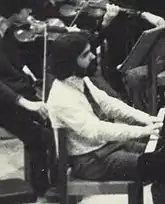 | ||
| 1997 | Earl Wild | The Romantic Master - Works of Saint-Saëns, Händel | |||
| 1998 | János Starker | Bach: Suiten für Cello Solo Nr. 1–6 | 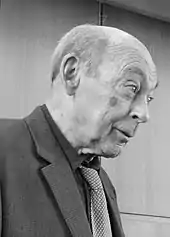 | ||
| 1999 | Murray Perahia | Bach: Englische Suiten 1, 3 und 6 | 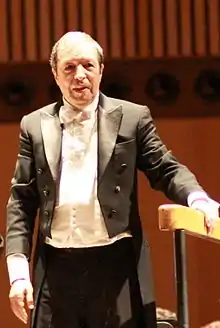 | ||
| 2000 | Vladimir Ashkenazy | Schostakowitsch: 24 Präludien und Fugen, Op. 87 |  | ||
| 2001 | Tobias Lehmann (Produzent), Jens Schünemann (Toningenieur) und Sharon Isbin | Dreams of a World (Werke von Lauro, Ruiz-Pipò, Duarte, Etc.) | 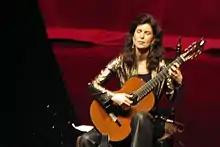 | ||
| 2002 | Arne Akselberg (Produzent, Toningenieur) und Truls Mørk | Britten Cello Suites (1–3) | 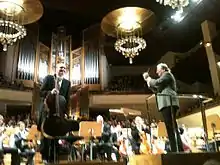 | ||
| 2003 | Andreas Neubronner (Produzent, Toningenieur) und Murray Perahia | Chopin: Études, Op. 10 und Op. 25 |  | ||
| 2004 | Emanuel Ax | Haydn: Klavierkonzert Nr. 29, 31, 34, 35 und 49 |  | ||
| 2005 | David Russell | Aire Latino (Morel, Villa-Lobos, Ponce, etc.) | |||
| 2006 | Evgeny Kissin | Scriabin, Medtner, Stravinsky | 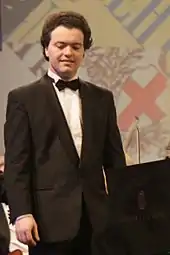 | ||
| 2007 | Maurizio Pollini | Chopin: Nocturnes |
|
 | |
| 2008 | Garrick Ohlsson | Beethoven: Sonatas, Vol. 3 |
|
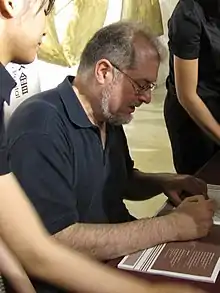 | |
| 2009 | Gloria Cheng | Piano Music of Salonen, Stucky andLutosławski |
|
||
| 2010 | Sharon Isbin mit Joan Baez und Mark O’Connor | Journey to the New World |
|
||
| 2011 | Paul Jacobs | Messiaen: Livre Du Saint-Sacrement |
|
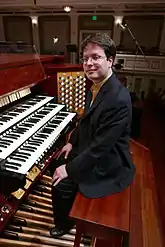 | |
Weblinks
- Offizielle Website der Grammy Awards – Recording Academy, Los Angeles (englisch)
- Grammy Award for Best Instrumental Soloist Performance (without orchestra) bei grammy.com (englisch)
Einzelnachweise
- Grammy Awards. Abgerufen am 15. Juli 2019 (englisch).
- The Official Site of the Grammy Awards – Overview. Abgerufen am 15. Juli 2019 (englisch).
- GRAMMY Awards Winners for Best Classical Performance-Instrumental Soloist(s) (without orchestra). Abgerufen am 15. Juli 2019 (englisch).